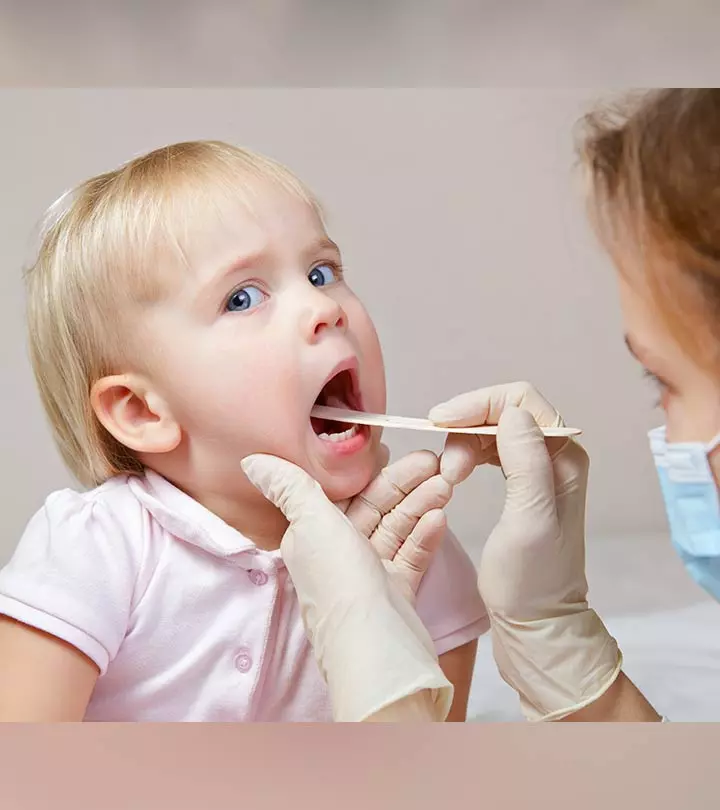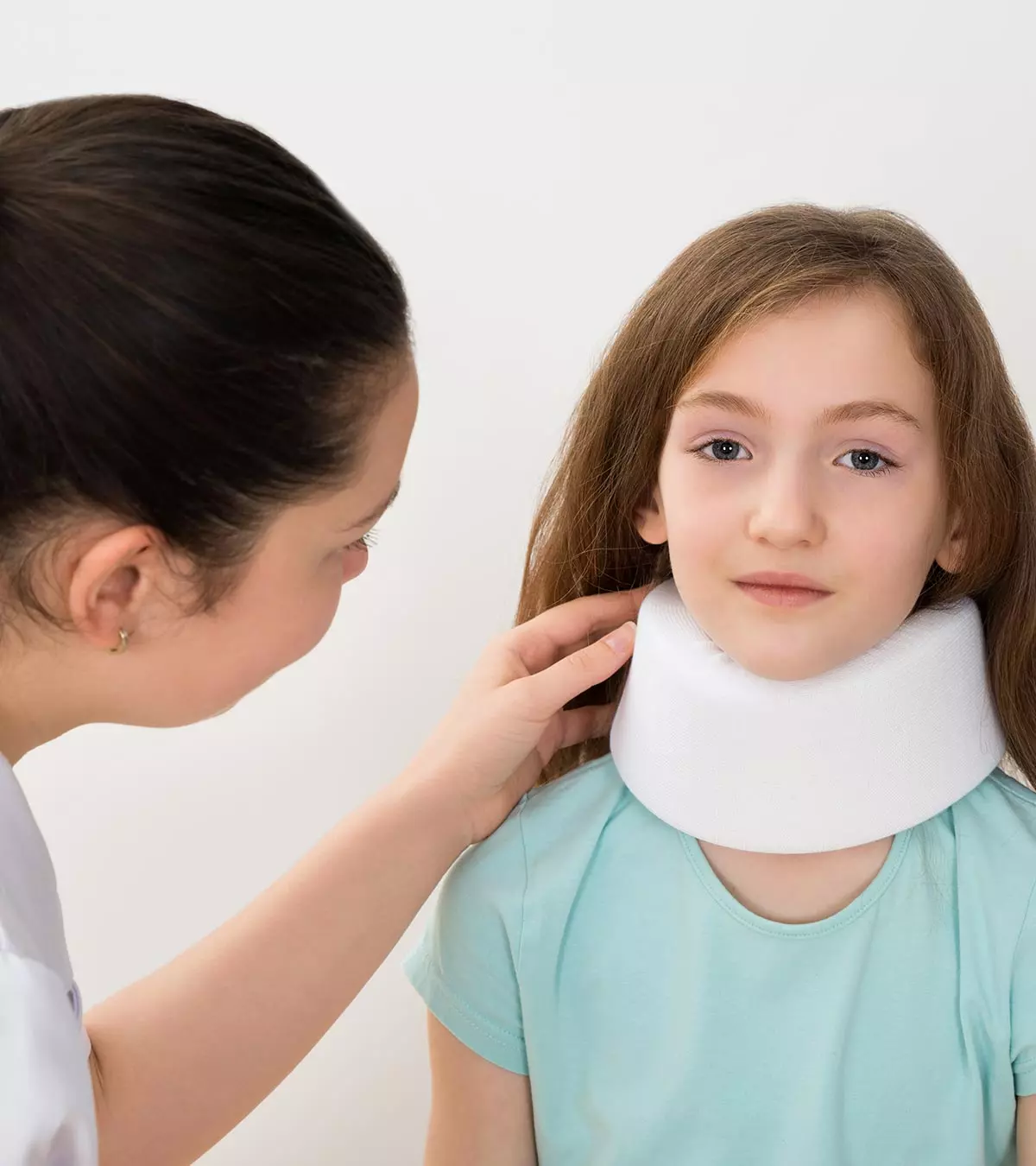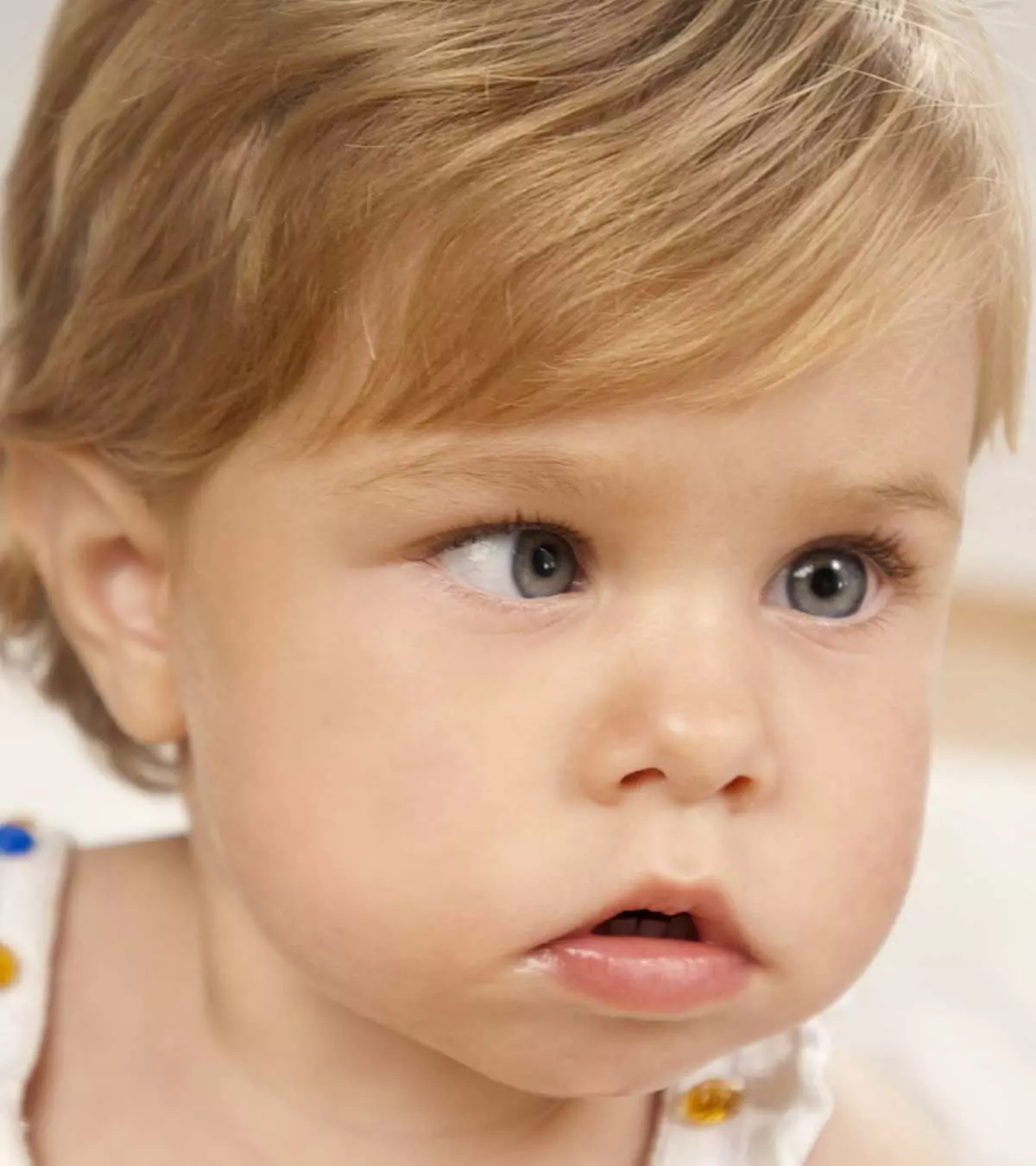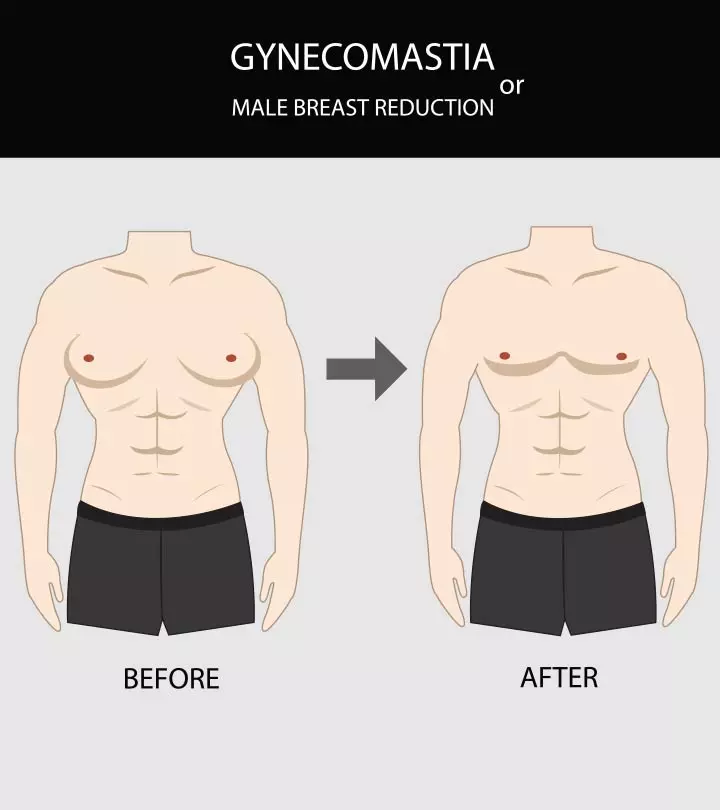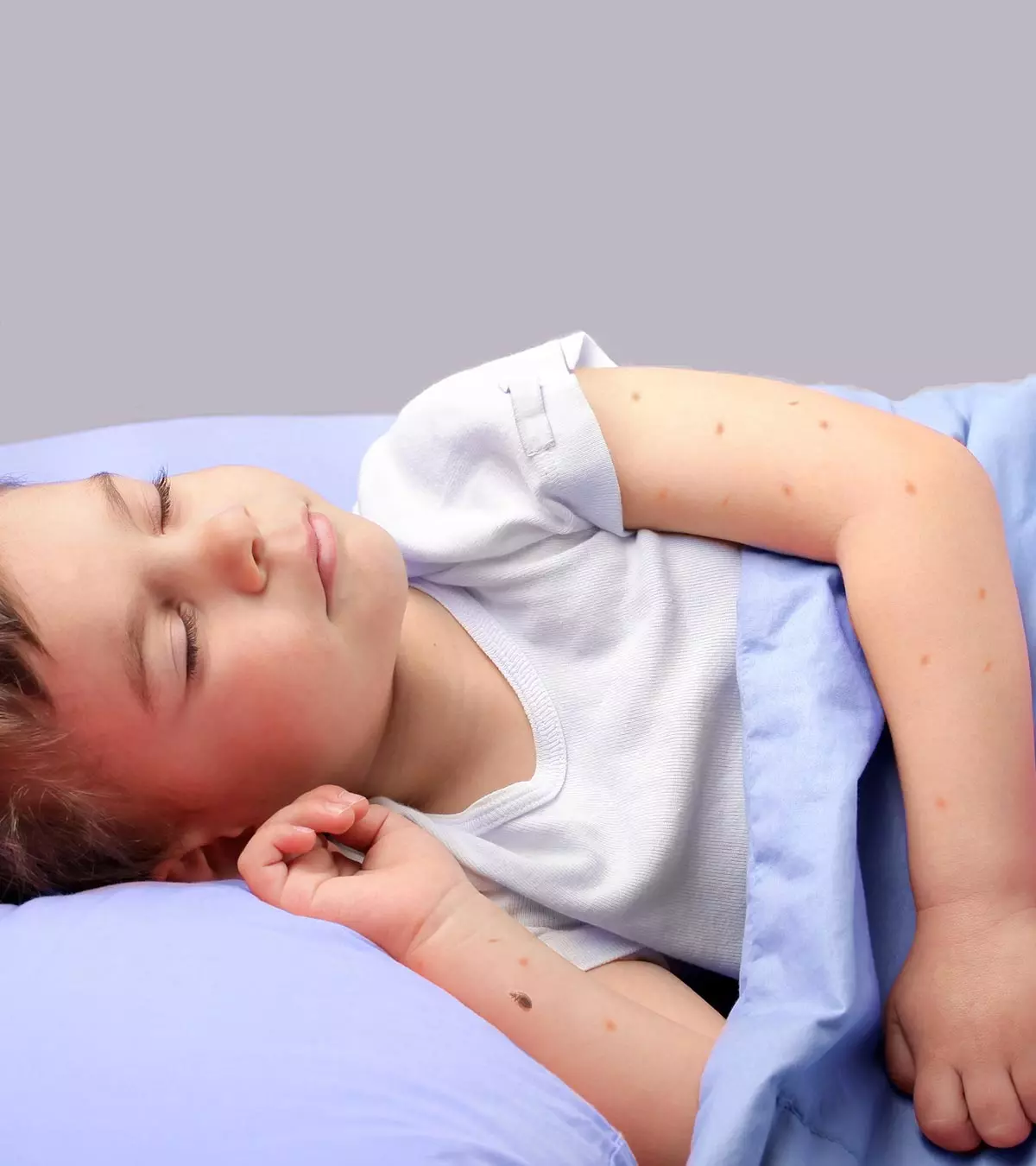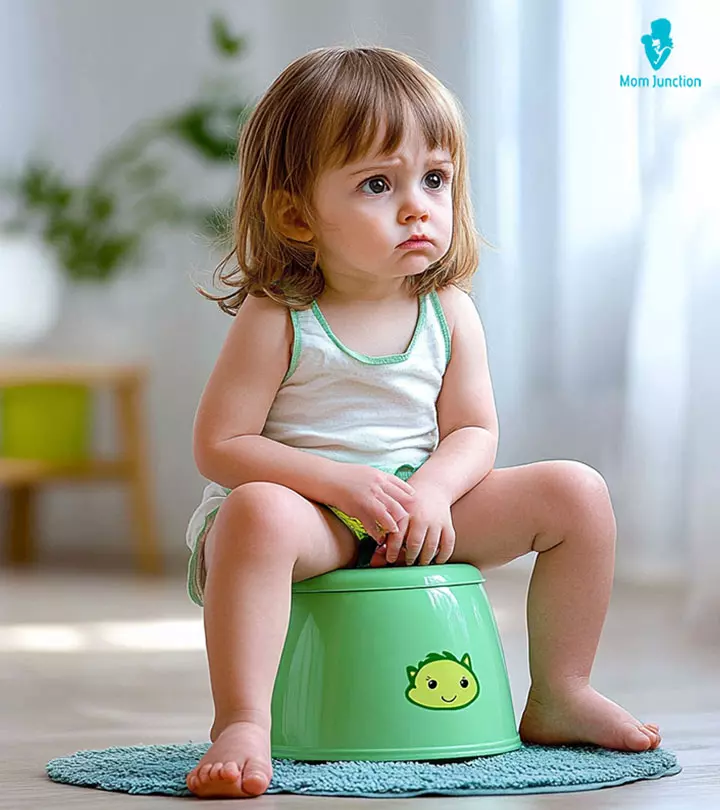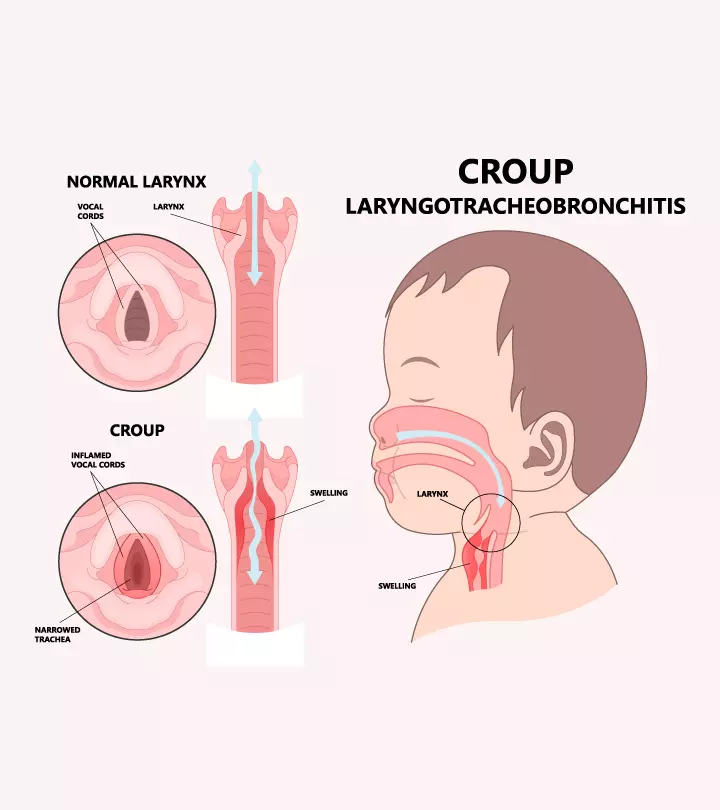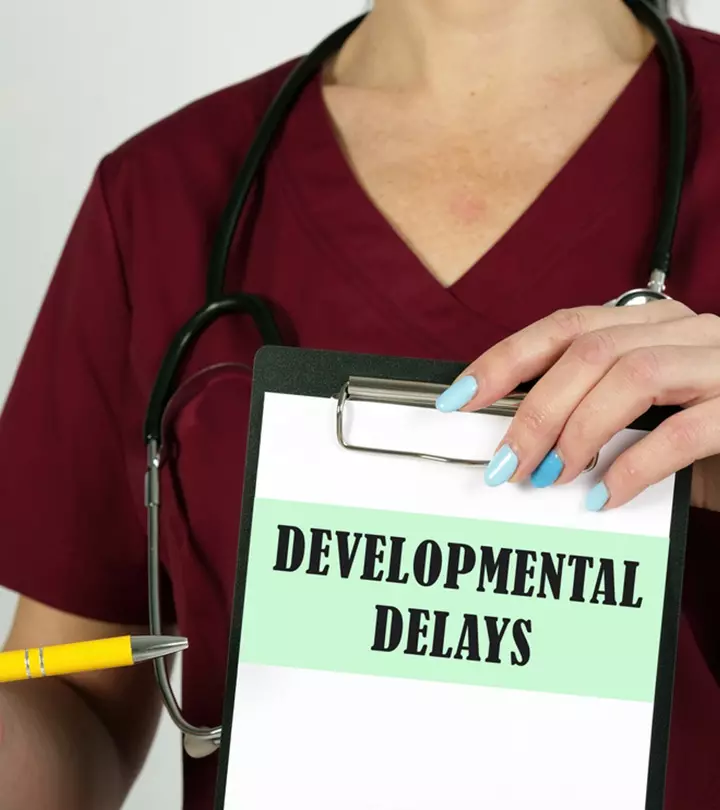
Image: Shutterstock

Developmental delay in children should be evaluated by a pediatrician. Delays are diagnosed when they take longer to reach developmental milestones (age-specific skills) than expected of their age. According to the Centers for Disease Control and Prevention, developmental delays and disabilities are prevalent among one in six US children. That said, each child is unique, and a little delay in attaining milestones is not a reason to worry (1).
However, if children are continuously lagging in their movement, communication, behavior, and thinking and learning abilities, it might indicate an underlying problem. If the developmental delay is long-term, it might be called a developmental disability, such as intellectual disability or cerebral palsy (2).
In this post, we discuss the types, causes, symptoms, diagnoses, and ways to help a child with developmental delay.
Key Pointers
- Cognitive, motor, socioemotional, speech and language, and adaptive delays are the types of developmental delays in children.
- Developmental screening includes a medical history assessment, physical and developmental assessment, and hearing test.
- In addition to developmental therapies, you can teach and encourage your child to help them attain their full potential.
- Children with high-risk developmental issues and chronic disease signals may require assistance from specialists and therapists.
What Are The Types Of Developmental Delay In Children?
Developmental delays occur in five areas. When a child shows delay in more than one development area, it is known as global developmental delay. The types of developmental delays are:
1. Cognitive delay: Cognitive delay may affect intellectual function, causing intellectual disability in children and declining their ability to think, learn, and solve problems. A learning disability may result from cognitive delays, leading to difficulties in comprehension and understanding, which become evident when children start going to school or even earlier. (3) (4) (5) (6).
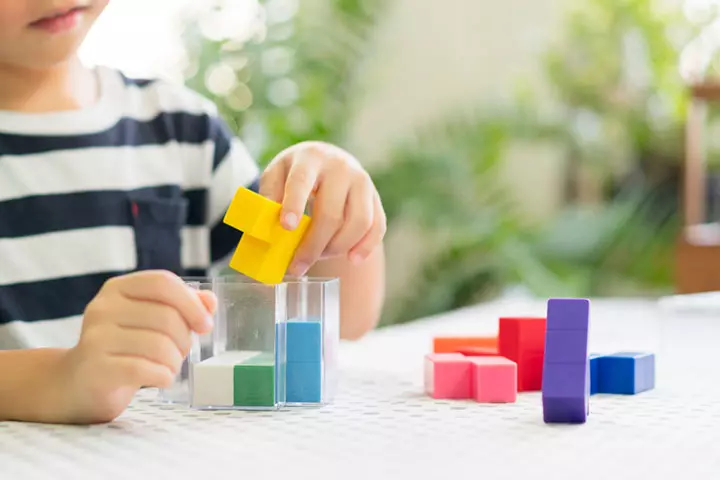
Image: Shutterstock
Causes of cognitive delay
- Genetic disorders in children may cause the inheritance of mutated genes. For example, Down syndrome and fragile X syndrome.
- Injury during pregnancy or the child’s inability to develop properly in the womb
- Problems during birth, such as inadequate oxygen (birth hypoxia) or intracranial bleedsiAny bleeding in the brain’s functional tissue and adjacent three layers of membrane , or hemorrhage.
- Health conditions such as malnutrition, untreated meningitis, whooping cough, seizure disorders, shaken baby syndromeiLife-threatening brain and neck injuries in babies caused when they are violently shaken , and exposure to lead or mercury
Signs of cognitive delay
- Delay in sitting, crawling, or walking
- Speech delays
- Inability to pay attention for long
- Inability to solve simple problems
- Absence of logical thinking or completing simple tasks
- Memory problems
- Inability to think logically and understand social rules
- Infantile behavior
Treatment for cognitive delay
- Play therapy (teaching skills through play)
- Occupational therapyiTreatment that helps people with sensory, physical, or cognitive issues to improve their ability to perform their daily tasks
- Speech therapy
- Special attention in school, which may also include an individualized education plan
 Research finds
Research finds2. Motor delay: Children with difficulty in fine and gross motor skills find it difficult to coordinate large muscles (arms and legs) and small muscles (hands) (4) (6) (7) (8).
Causes of motor delay
- Conditions affecting muscles, such as cerebral palsy and muscular dystrophy in children
- Problems with body structure
- Birth hypoxia and intracranial hemorrhage
- Prolonged labor
Signs of motor delay
- Infants have problems with crawling and rolling over
- Inability to control head and neck
- Stiffness in muscles, difficulty in walking, and scissor gaitiA condition where knees and thighs cross each other while walking, creating a scissor-like pattern
- Speech problems
- Difficulty in swallowing
- Improper body posture
- Muscle spasms
- Difficulty in running
- Problems climbing up and down the stairs
- Difficulty in holding something, picking small objects, and tying shoes
Treatment for motor delay
- Physical therapy (develops gross and fine motor skills)
- Occupational therapy (develops fine motor skills and sensory integration problemsiA condition where the brain struggles to process information coming from several senses )
- In mild cases, physical activity and play also help
3. Socioemotional delay: Socioemotional delay affects the social and emotional skills of children, making it difficult for them to interact with others and communicate their thoughts and feelings (4) (6) (8).
Causes of socioemotional delay
- Neurobehavioral disorders, such as autism spectrum disorder and attention deficit hyperactivity disorder (ADHD)
- Anxiety disorders
Signs of socioemotional delay
- Infants do not respond to waves or smiles
- No eye contact
- No social interaction
- Repetitive movements
- Scared of new people
- Difficulty in starting a conversation with others
- Inability to calm down and adapt to change
- Prolonged tantrums
Treatment of socioemotional delay
- Attachment therapy (counseling children, parents, and caregivers to build attachment)
- Play therapy
- Behavioral therapy
- Skill-oriented therapy (focusing on developing skills)
4. Speech and language delay: Children with delayed speech and language skills find it difficult to communicate with others and understand words and concepts (4) (6) (8) (9).

Image: IStock
Causes of speech and language delay
- Oral motor problems, such as weak muscles of the mouth
- Problems with tongue and jaw movement, leading to speech production disorder
- Brain damage (cerebral palsy)
- Hearing loss
- Genetic disorders
- Environmental factors such as lack of stimulation
- Being a twin
- Living in a bilingual home (children find it difficult to interpret two languages simultaneously)
Signs of speech and language delay
- Reduced vocabulary
- Delay in initial speech, such as saying simple words “papa” and “mama.”
- Inability to form age-appropriate sentences
- Doesn’t talk
- Delay in expressing thoughts
Treatment of speech and language delay
- Increased communication with the child
- Reading to the child
- Hearing test
- Getting ear infections treated
- Speech therapy for kids
- Special attention in school
Besides the conventional measures to help children with speech delay, certain assistive technologies may have an important role to play.
Dana, a mother, talks about one such gadget that helped her daughter communicate. She says, “My daughter, Maya, is almost five. She can clearly speak approximately 15-20 words. With her talker (an iPad with a communication app), she can speak approximately 700 words, with thousands more available at the touch of a button if needed. She can say “Mommy” and “Daddy” with her voice. With her talker, she can tell me that today is Friday, and she’s going to the therapy gym in the afternoon, and she wants to ride on the big swing and the tire swing and do an art project… With her talker, she tells jokes and is sassy and is proud, so proud, to tell us things and to connect with us. If she only had her speaking voice, I would barely know her (i).”
 Point to consider
Point to consider5. Adaptive delay: Children with adaptive developmental delay find it difficult to learn age-appropriate life skills (self-help skills). As a result, it becomes challenging for them to live an independent life (10).
Causes of adaptive delay
- Premature birth, leading to slow muscle development
- A genetic condition such as Down syndrome
- Nerve and muscle disorders, such as cerebral palsy and muscular dystrophy
- Autism spectrum disorder
- Problems with gross and fine motor skills
- Delay in acquiring cognitive skills
Signs of adaptive delay
- Inability to manage daily activities, such as feeding, dressing, or brushing teeth
- Speech and language difficulties
- Problems with reasoning and problem solving
- Lacking organizational skills, such as following a routine or completing assignments
Treatment for adaptive delay
- Physical therapy
- Behavioral therapy
- Occupational therapy (focuses on self-help skills)
- Sensory practice to allow children adapt to the surroundings
How Is Developmental Delay Diagnosed In Children?
As per the data acquired from the National Health Interview Survey, from 2015-2018, approximately 17.8% of children between 3-17 years in the United States have been clinically diagnosed with some form of developmental disability. The diagnoses that surfaced as the most pervasive were ADHD and learning disabilities, trailed by autism spectrum disorder in children and other developmental delays.

Proportion of US children diagnosed with developmental disabilities (2015-2018)
Source: U.S. children diagnosed with a developmental disability; Statista/NCHS/CDCHealthcare providers use developmental screening to diagnose the challenges children are experiencing. The process followed is (1) (11):
- Knowing the medical history: Parents may be interviewed to gain information about the medical details, medical issues, birth defects, medications, and surgeries their children might have had. The doctor may also ask specific questions about the child’s daily routine, general behavior at home, and development since birth.
Furthermore, the health professional may want to know the details about the parents’ medical history or health condition and the mother’s pregnancy, maternal infections, or other related problems.
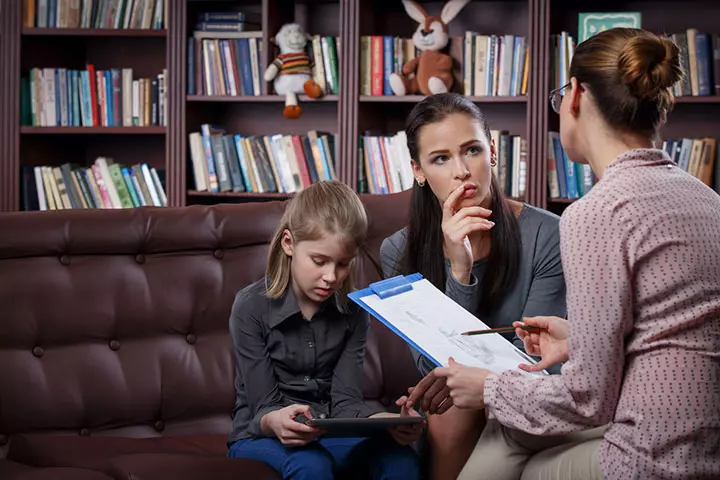
Image: IStock
- Physical examination: Doctors may examine children to check their physical health and general appearance. They may check their head, eyes, skin, muscle movement, speech, and other characteristics to rule out the possibility of any disorder.
- Developmental assessment: A developmental-behavioral pediatrician may assess children’s behavior, social skills, focusing abilities, language skills, and learning abilities to check the presence or absence of disorders, such as ADHD, autism spectrum disorder, or learning disorders. Some of these developmental tests include ADOS (for autistic children), Denver developmental test, and the Batelle developmental test.
- Hearing test: The healthcare provider may also refer children to an audiologist to check hearing abilities that affect language and speech. In young infants, brain stemiThe stalk-like structure that links your brain to the spinal and helps in maintaining the vital functions of the body -evoked potential tests are performed. The audiologist may perform different tests based on the child’s age. If a problem is diagnosed, children are referred to a specialist for further treatment.
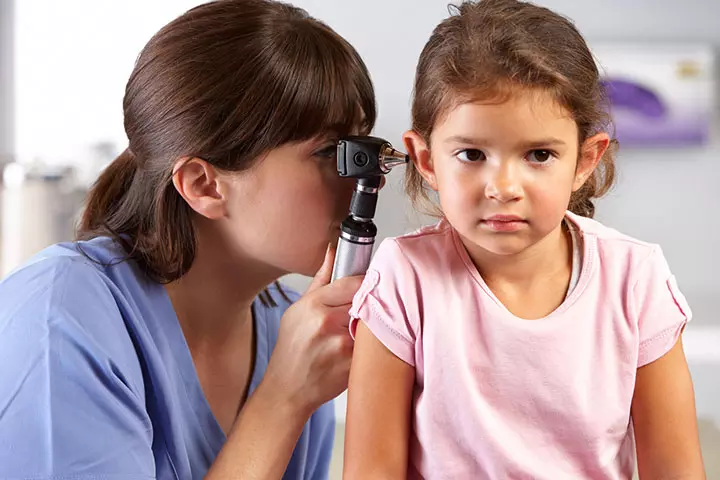
Image: IStock
There are no specific laboratory tests to determine developmental delay in children. However, based on the developmental screening, pediatricians advise further testing and steps for treatment.
How To Deal With Developmental Delay In Children?
Apart from the therapies, some other strategies used to address developmental delay are (12):
- Breaking down essential skills into small steps and giving clear instructions to children
- Repeating instructions and giving adequate time to complete the task
- Rewarding for accomplishments
- Teaching interpersonal skills and imparting social skills training
- Using visual instructions, such as pictures, posters, and videos
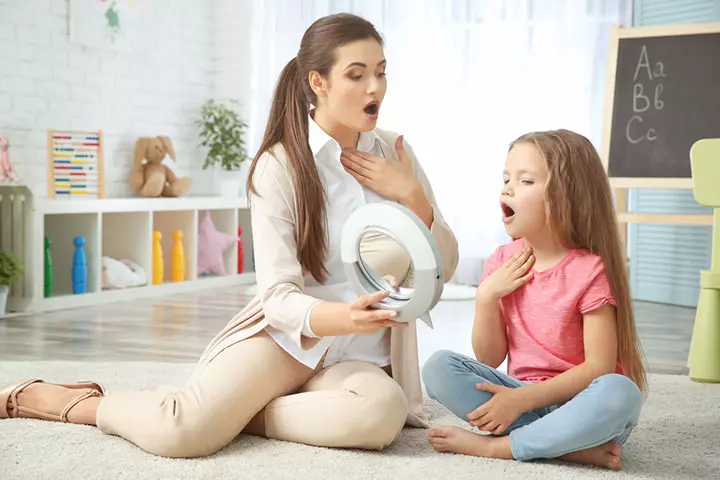
Image: Shutterstock
- Using gestures
- Integrating learning with fun
- Providing supportive environment
- Taking the help of parents to understand children
- Observing children understand unexpressed signs and signals
The team of professionals that may help children attain their full potential includes pediatricians, physiotherapists, psychologists, social workers, audiologists, speech pathologists, special education teachers, and occupational therapists (2).
Can Children Overcome Developmental Delay?
Although there is no cure for developmental delay, early intervention may help children overcome the challenges more effectively. The progress depends on the degree of delay and effectiveness of the interventions. In addition, management and treatment are slow and require parents’ persistence to continue therapy for months and years.
Children with mild developmental delay and without any sign of physical problems may improve with the help of close monitoring and appropriate stimulation activities.
However, children with high-risk developmental disorders and signs of chronic illness may need support from specialists and therapists (13) (14).
Frequently Asked Questions
1. Can a child outgrow developmental delay?
Yes, most cases of delayed milestones may resolve as the child grows older. However, it is crucial to carefully follow the delay until it resolves or shows signs of deterioration (15).
2. Does delayed development mean autism?
No, all developmental delays are not termed as autism. Developmental delay may be isolated (delay in developing a certain aspect of a milestone) or global developmental delay (a significant delay in at least two developmental aspects below five years of age). Autism spectrum disorder is a group of diverse conditions that arise due to problems with the development of the brain (14) (16).
3. What percentage of children have developmental delays?
According to the National Institutes Of Health (NIH), the global developmental delay incidence among school-aged and younger children is about one to three percent (17).
Early diagnosis and prompt and prolonged treatment can have a great impact on the development and learning of children with developmental delays. While each child reaches a milestone at their own pace, you may consider getting a doctor’s opinion if you notice long-lasting or persistent delays. The therapy for developmental delays needs consistent efforts to yield results. The process may be taxing for you and can take a toll on you. So, do not forget to care for yourself while caring for your child and seek professional help or help from your loved ones if you feel overwhelmed.
Infographic: Therapies For Developmental Delays
When children are diagnosed with developmental delays with or without behavioral issues, doctors often refer them to therapists. The therapies depend on the type and severity of the child’s health condition. Read this infographic to learn about the different kinds of therapies available.
Some thing wrong with infographic shortcode. please verify shortcode syntax
Illustration: Types Of Developmental Delays In Children & Ways To Manage

Image: Dall·E/MomJunction Design Team
Discover the various developmental delays that might be seen in children, ways to manage them and promote their growth and development, in this video.
Personal Experience: Source
MomJunction articles include first-hand experiences to provide you with better insights through real-life narratives. Here are the sources of personal accounts referenced in this article.
i. An open letter to the parent of a child with speech delays.https://niederfamily.blogspot.com/2013/04/an-open-letter-to-parent-of-child-with.html
References
- Developmental Delay in Children.
https://my.clevelandclinic.org/health/diseases/14814-developmental-delay-in-children - Developmental Delay.
https://raisingchildren.net.au/guides/a-z-health-reference/developmental-delay - What are developmental delays?
https://www.understood.org/en/articles/what-you-need-to-know-about-developmental-delays - Types of Developmental Delays in Children.
https://nyulangone.org/conditions/developmental-delays-in-children/types - What are Cognitive Developmental Delays?
https://thewarrencenter.org/help-information/cognitive/what-are-cognitive-developmental-delays/ - Developmental Delays.
https://www.beaumont.org/services/childrens/developmental-delays - Is Your Baby’s Physical Development on Track?
https://www.healthychildren.org/English/ages-stages/baby/Pages/Is-Your-Babys-Physical-Development-on-Track.aspx - Addressing the Types of Developmental Delays.
https://www.eccm.org/blog/addressing-the-types-of-developmental-delays - Speech and Language Delay.
https://familydoctor.org/condition/speech-and-language-delay/ - What are Adaptive or Self-help Developmental Delays?
https://thewarrencenter.org/help-information/adaptive-self-help/what-are-adaptive-or-self-help-developmental-delays/ - Diagnosing Developmental Delays in Children.
https://nyulangone.org/conditions/developmental-delays-in-children/diagnosis - Developmental Delay.
https://allplaylearn.org.au/early/educator/developmental-delay/ - Developmental Delay (DD) – Diagnosis and Prognosis.
https://parent2parent.org.nz/resource-hub/developmental-delay-dd-diagnosis-and-prognosis/ - Ying Ying Choo et al.; (2019); Developmental delay: identification and management at primary care level.
https://www.ncbi.nlm.nih.gov/pmc/articles/PMC6441684/ - Israr Khan and Bennett L. Leventhal; (2025); Developmental Delay.
https://www.ncbi.nlm.nih.gov/books/NBK562231/ - Autism.
https://www.who.int/news-room/fact-sheets/detail/autism-spectrum-disorders - Developmental Delay.
https://www.ncbi.nlm.nih.gov/books/NBK562231/ - Delayed Speech or Language Development.
https://kidshealth.org/en/parents/not-talk.html
Community Experiences
Join the conversation and become a part of our nurturing community! Share your stories, experiences, and insights to connect with fellow parents.
Read full bio of Dr. Mubina Agboatwalla
Read full bio of Pragya Bhargavi
Read full bio of Dr. Ritika Shah
Read full bio of Apoorva K







